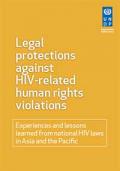Publications - Released in 2013
The UN Political Declaration on HIV/AIDS (2011) reaffirmed that the full realization of human rights and fundamental freedoms for all is an essential element in the global response to HIV. The enactment of laws to protect the human rights of PLHIV and key populations at higher risk of HIV is essential to creating an enabling environment for effective HIV responses. The UN Economic and Social Commission for Asia Pacific (ESCAP) Resolution 66-10 (2010) calls on member states to ground universal access to HIV services in human rights and to address legal barriers to HIV responses, and ESCAP Resolution 67-9 (2011) commits states to initiate reviews of national laws, policies and practices to enable the full achievement of universal access targets with a view to eliminating all forms of discrimination against PLHIV and key affected populations.
This study is intended to inform the efforts of governments and civil society to strengthen the enabling legal environment for HIV responses. The focus is both on the content of protective laws and issues that arise in effective implementation of protective laws. Ensuring protective legislation is in place is insufficient – attention must also be paid to how the law is implemented and enforced.
Downloads
Organizations
- United Nations Development Programme (UNDP)






